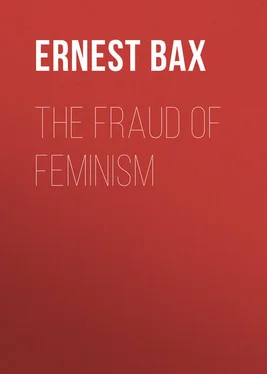Ernest Bax - The Fraud of Feminism
Здесь есть возможность читать онлайн «Ernest Bax - The Fraud of Feminism» — ознакомительный отрывок электронной книги совершенно бесплатно, а после прочтения отрывка купить полную версию. В некоторых случаях можно слушать аудио, скачать через торрент в формате fb2 и присутствует краткое содержание. Жанр: foreign_antique, foreign_prose, на английском языке. Описание произведения, (предисловие) а так же отзывы посетителей доступны на портале библиотеки ЛибКат.
- Название:The Fraud of Feminism
- Автор:
- Жанр:
- Год:неизвестен
- ISBN:нет данных
- Рейтинг книги:3 / 5. Голосов: 1
-
Избранное:Добавить в избранное
- Отзывы:
-
Ваша оценка:
- 60
- 1
- 2
- 3
- 4
- 5
The Fraud of Feminism: краткое содержание, описание и аннотация
Предлагаем к чтению аннотацию, описание, краткое содержание или предисловие (зависит от того, что написал сам автор книги «The Fraud of Feminism»). Если вы не нашли необходимую информацию о книге — напишите в комментариях, мы постараемся отыскать её.
The Fraud of Feminism — читать онлайн ознакомительный отрывок
Ниже представлен текст книги, разбитый по страницам. Система сохранения места последней прочитанной страницы, позволяет с удобством читать онлайн бесплатно книгу «The Fraud of Feminism», без необходимости каждый раз заново искать на чём Вы остановились. Поставьте закладку, и сможете в любой момент перейти на страницу, на которой закончили чтение.
Интервал:
Закладка:
It was a saying of the late Dr Henry Maudsley: “ Sex lies deeper than culture .” By this we may understand to be meant that sex differences are organic. All authorities on the physiological question are agreed that woman is less well-organised, less well-developed, than man. Dr de Varigny asserts that this fact is traceable throughout the whole female organism, throughout all its tissues, and all its functions. For instance, the stature of the human female is less than that of the man in all races. As regards weight there is a corresponding difference. The adult woman weighs, on the average, rather more than 11 lbs. less than the man; moreover as a rule a woman completes her growth some years earlier than a man. The bones are lighter in the woman than in the man; not absolutely but in proportion to the weight of the body. They are, it is stated, not merely thinner but more fragile. The difference may be traced even to their chemical composition. The whole muscular development is inferior in woman to that in man by about one-third. The heart in woman is smaller and lighter than in man – being about 10½ oz. in man as against slightly over 8 oz. in woman. In the woman the respiratory organs show less chest and lung capacity. Again, the blood contains a considerably less proportion of red to white corpuscles. Finally, we come to the question of the size and constitution of the brain. (It should be observed that all these distinctions of sex show themselves more or less from birth onwards.)
Specialists are agreed that at all ages the size of the brain of woman is less than that of man. The difference in relative size is greater in proportion according to the degree of civilisation. This is noteworthy, as it would seem as though the brain of man grew with the progress of civilisation, whereas that of woman remains nearly stationary. The average proportion as regards size of skull between the woman and man of to-day is as 85 to 100. The weight of brain in woman varies from 38½ oz. to 45½ oz.; in man, from 42 oz. to 49 oz. This represents the absolute difference in weight, but, according to Dr de Varigny, the relative weight — i. e. the weight in proportion to that of the whole body – is even more striking in its indication of inferiority. The weight of the brain in woman is but one-forty-fourth of the weight of the body, while in man it is one-fortieth. This difference accentuates itself with age. It is only 7 per cent. in favour of man between twenty and thirty years; it is 11 per cent. between thirty and forty years. As regards the substance of the brain itself and its convolutions, the enormous majority of physiologists are practically unanimous in declaring that the female brain is simpler and smoother, its convolutions fewer and more superficial than those of the male brain, that the frontal lobes, generally associated with the intellectual faculties, are less developed than the occipital lobes, which are universally connected with the lower psychological functions. The grey substance is poorer and less abundant in woman than in man, while the blood vessels of the occipital region are correspondingly fuller than those supplying the frontal lobes. In man the case is exactly the reverse. It cannot be denied by any sane person familiar with the barest elements of physiology that the whole female organism is subservient to the functions of child-bearing and lactation, which explains the inferior development of those organs and faculties which are not specially connected with this supreme end of Woman.
It is the fashion of Feminists, ignoring these fundamental physiological sex differences, to affirm that the actual inferiority of women, where they have the honesty to admit such an obvious fact, is accountable by the centuries of oppression in which Woman has been held by wicked and evil-minded Man. The absurdity of this contention has been more than once pointed out. Assuming its foundation in fact, what does it imply? Clearly that the girls inherit only through their mothers and boys only through their fathers, an hypothesis plainly at variance with the known facts of heredity. Yet those who maintain that distinction of intelligence, etc., between the sexes are traceable to external conditions affecting one sex only and inherited through that sex alone, cannot evade the above assumption. Those, therefore, who regard it as an article of their faith that Woman would show herself not inferior in mental power to man, if only she had the chance of exercising that power, must find a surer foundation for their opinion than this theory of the centuries of oppression, under which, as they allege, the female sex has laboured.
We now come to the important question of morbid and pathological mental conditions to which the female sex is liable and which are usually connected with those constitutional disturbances of the nervous system which pass under the name of hysteria . The word is, as everyone knows, derived from hystera — the womb , and was uniformly regarded by the ancients as directly due to disease of the uterus , this view maintaining itself in modern medicine up till well-nigh the middle of the nineteenth century. Thus Dr J. Mason Good (in his “Study of Medicine,” 1822, vol. iii., p. 528, an important medical text-book during the earlier half of the nineteenth century) says: “With a morbid condition of this organ, hysteria is in many instances very closely connected, though it is going too far to say that it is always dependent upon such condition, for we meet with instances, occasionally, in which no possible connexion can be traced between the disease and the organ,” etc. This is perhaps the first appearance, certainly in English medicine, of doubts being thrown on the uterine origin of the various symptoms grouped under the general term, hysteria . Towards the latter part of the nineteenth century the prevalent view tended more and more to dissociate hysteria from uterine trouble. Lately, however, some eminent pathologists have shown a tendency to qualify the terms of the latter view. Thus Dr Thomas Stevenson in 1902 admits that “it [hysteria] frequently accompanies a morbid state of the uterus,” especially where inflammation and congestion are present, and it is not an uncommon thing for surgeons at the present time to remove the ovaries in obstinate cases of hysteria. On the other hand Dr Thomas Buzzard, in an article on the subject in Quain’s Dictionary of Medicine , 1902, states that hysteria is only exceptionally found in women suffering from diseases of the genital organs, and its relation to uterine and ovarian disturbances is probably neither more nor less than that which pertains to the other affections of the nervous system which may occur without any obvious material cause. Dr Thomas Luff (“Text-Book on Forensic Medicine,” 1895) shows that the derangements of the reproductive functions are undoubtedly the cause of various attacks of insanity in the female. Dr Savage, in his book “On Neuroses,” says that acute mania in women occurs most frequently at the period of adult and mature life, and may occasionally take place at either extreme age. Acute mania sometimes occurs at the suppression of the menses . The same is true of melancholia and other pathological mental symptoms. Dr Luff states that acute mania may replace hysteria; that this happens at periods such as puberty, change of life and menstruation. These patients in the intervals of their attacks are often morbidly irritable or excitable, but as time goes on their energies become diminished and their emotions blunted (“Forensic Medicine,” ii. 307). Such patients are often seized with a desire to commit violence; they are often very mischievous, tearing up clothes, breaking windows, etc. In this mental disorder the patient is driven by a morbid and uncontrollable impulse to such acts. It is not accompanied by delusions, and frequently no change will have been noticed in the individual prior to the commission of the act, and consequently, says Dr Luff, “there is much difference of opinion as to the responsibility of the individual” (ii. 297). Among the acts spoken of Dr Luff mentions a propensity to set fire to furniture, houses, etc. All this, though written in 1895, might serve as a commentary on the Suffragette agitation of recent years. The renowned French professor, Dr Paul Janet (“Les Hysteriques,” 1894) thus defined hysteria: “Hysteria is a mental affection belonging to the large group of diseases due to cerebral weakness and debility. Its physical symptoms are somewhat indefinite, consisting chiefly in a general diminution of nutrition. It is largely characterised by moral symptoms, chief of which is an impairment of the faculty of psychological synthesis, an abolition and a contraction of the field of consciousness. This manifests itself in a peculiar manner and by a certain number of elementary phenomena. Thus sensations and images are no longer perceived, and appear to be blotted out from the individual perception, a tendency which results in their persistent and complete separation from the personality in some cases and in the formation of many independent groups. This series of psychological facts alternate the one with the other or co-exist. Finally this synthetic defect favours the formation of certain independent ideas, which develop complete in themselves, and unattached from the control of the consciousness of the personality. These ideas show themselves in affections possessing very various and unique characteristics.” According to Mr A. S. Millar, F.R.C.S.E. ( Encyclopædia Medica , vol. v.), “Hysteria is that.. condition in which there is imagination, imitation, or exaggeration… It occurs mostly in females and persons of nervous temperament, and is due to some nervous derangement, which may or may not be pathological.” Sir James Paget (“Clinical Lectures on Mimicry”) says also that hysterical patients are mostly females of nervous temperament. “They think of themselves constantly, are fond of telling everyone of their troubles and thus court sympathy, for which they have a morbid craving. Will power is deficient in one direction, though some have it very strongly where their interests are concerned.” He thinks the term “hysteria” in the sense now employed incorrect, and would substitute “mimicry.” “The will should be controlled by the intellect,” observes Dr G. F. Still of King’s College Hospital, “rather than by the emotions and the lack of this control appears to be at the root of some, at least, of the manifestations of hysteria.”
Читать дальшеИнтервал:
Закладка:
Похожие книги на «The Fraud of Feminism»
Представляем Вашему вниманию похожие книги на «The Fraud of Feminism» списком для выбора. Мы отобрали схожую по названию и смыслу литературу в надежде предоставить читателям больше вариантов отыскать новые, интересные, ещё непрочитанные произведения.
Обсуждение, отзывы о книге «The Fraud of Feminism» и просто собственные мнения читателей. Оставьте ваши комментарии, напишите, что Вы думаете о произведении, его смысле или главных героях. Укажите что конкретно понравилось, а что нет, и почему Вы так считаете.












